Psychology Assignment: Case Study Analysis, Research Methods & Ethics
VerifiedAdded on 2023/06/15
|9
|2142
|202
Essay
AI Summary
This psychology assignment provides a comprehensive overview of several key areas within the field. It begins with a case study analysis, employing cognitive and psychoanalytical approaches to understand a specific scenario involving anxiety and trauma. The assignment then delves into diff...
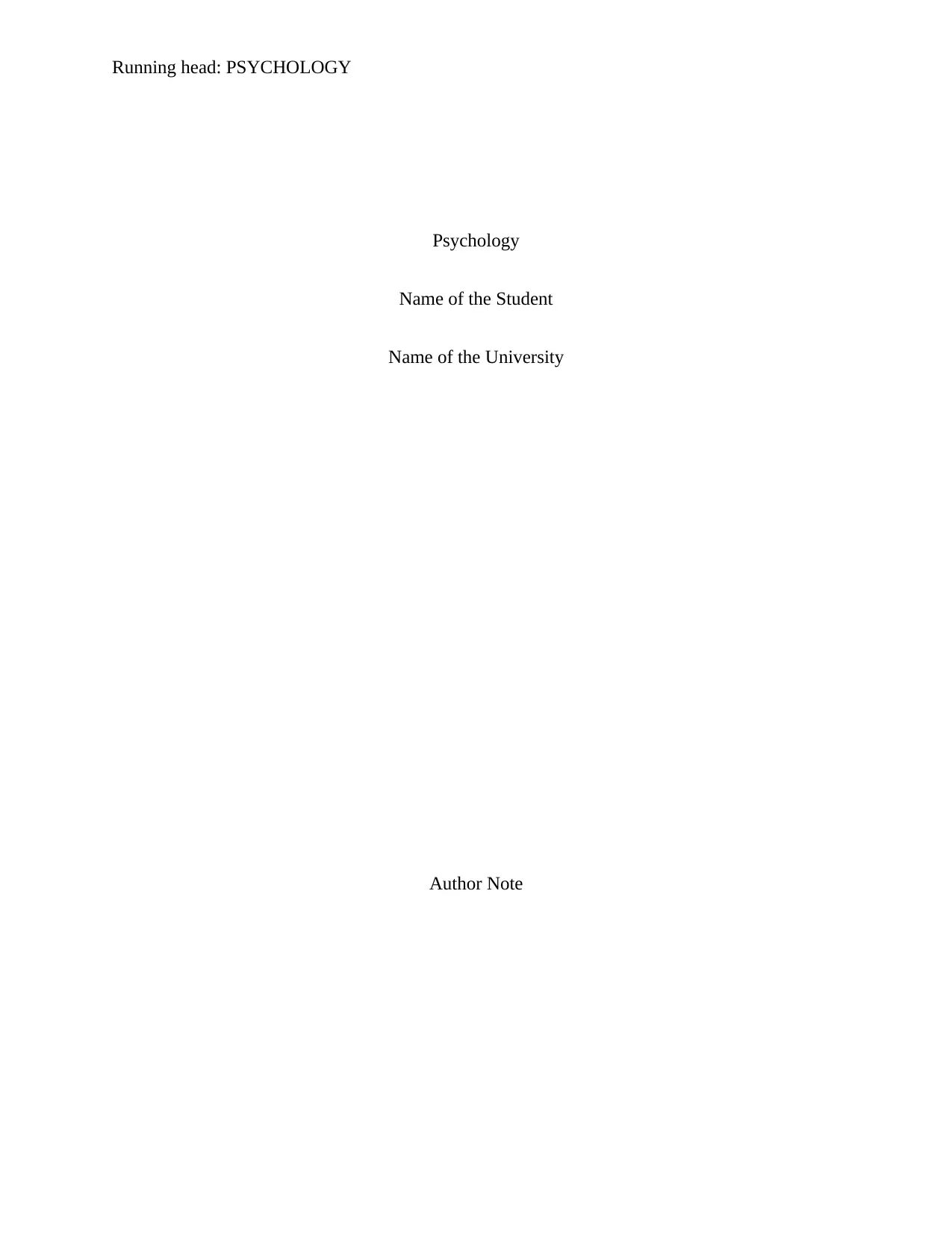
Running head: PSYCHOLOGY
Psychology
Name of the Student
Name of the University
Author Note
Psychology
Name of the Student
Name of the University
Author Note
Paraphrase This Document
Need a fresh take? Get an instant paraphrase of this document with our AI Paraphraser
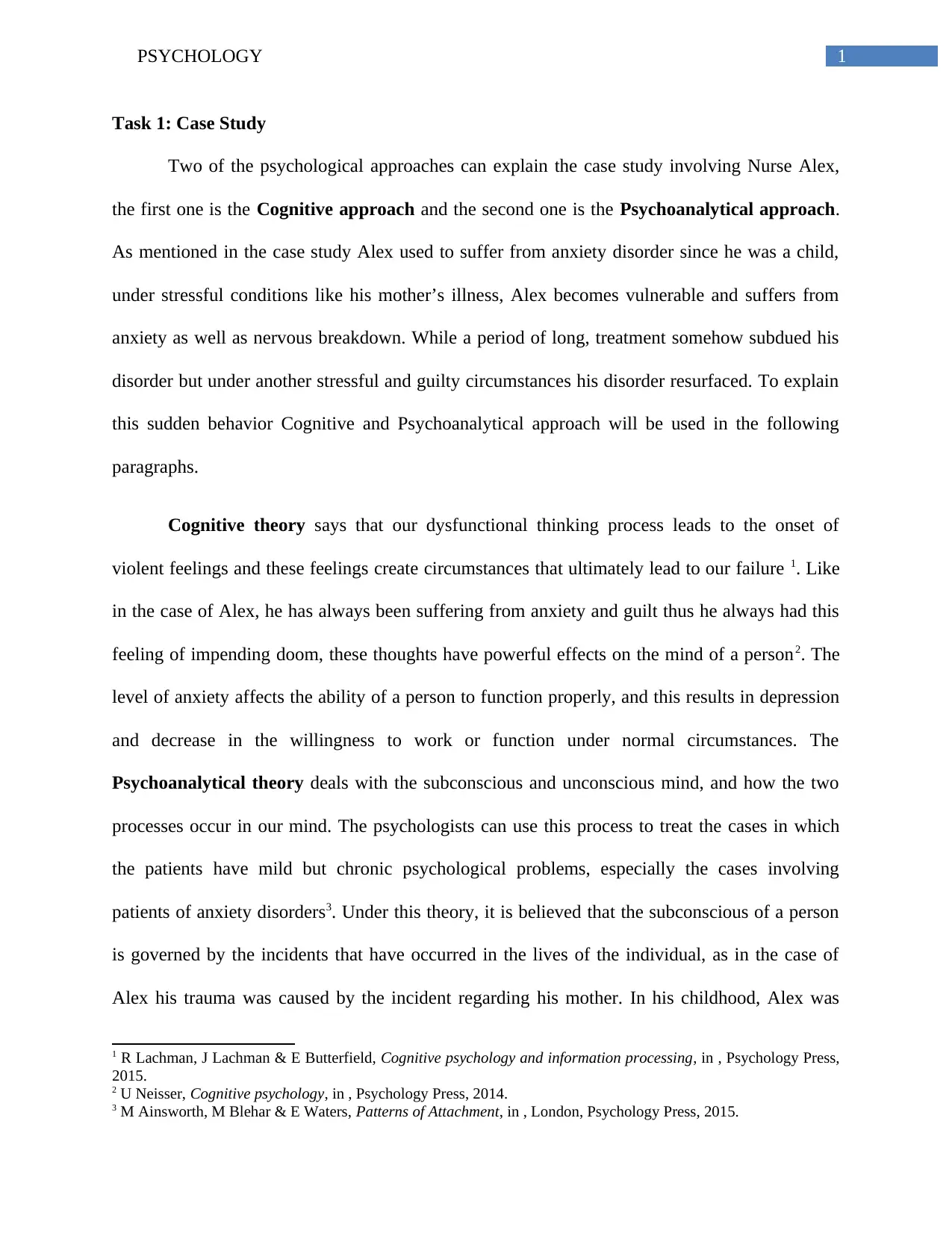
1PSYCHOLOGY
Task 1: Case Study
Two of the psychological approaches can explain the case study involving Nurse Alex,
the first one is the Cognitive approach and the second one is the Psychoanalytical approach.
As mentioned in the case study Alex used to suffer from anxiety disorder since he was a child,
under stressful conditions like his mother’s illness, Alex becomes vulnerable and suffers from
anxiety as well as nervous breakdown. While a period of long, treatment somehow subdued his
disorder but under another stressful and guilty circumstances his disorder resurfaced. To explain
this sudden behavior Cognitive and Psychoanalytical approach will be used in the following
paragraphs.
Cognitive theory says that our dysfunctional thinking process leads to the onset of
violent feelings and these feelings create circumstances that ultimately lead to our failure 1. Like
in the case of Alex, he has always been suffering from anxiety and guilt thus he always had this
feeling of impending doom, these thoughts have powerful effects on the mind of a person2. The
level of anxiety affects the ability of a person to function properly, and this results in depression
and decrease in the willingness to work or function under normal circumstances. The
Psychoanalytical theory deals with the subconscious and unconscious mind, and how the two
processes occur in our mind. The psychologists can use this process to treat the cases in which
the patients have mild but chronic psychological problems, especially the cases involving
patients of anxiety disorders3. Under this theory, it is believed that the subconscious of a person
is governed by the incidents that have occurred in the lives of the individual, as in the case of
Alex his trauma was caused by the incident regarding his mother. In his childhood, Alex was
1 R Lachman, J Lachman & E Butterfield, Cognitive psychology and information processing, in , Psychology Press,
2015.
2 U Neisser, Cognitive psychology, in , Psychology Press, 2014.
3 M Ainsworth, M Blehar & E Waters, Patterns of Attachment, in , London, Psychology Press, 2015.
Task 1: Case Study
Two of the psychological approaches can explain the case study involving Nurse Alex,
the first one is the Cognitive approach and the second one is the Psychoanalytical approach.
As mentioned in the case study Alex used to suffer from anxiety disorder since he was a child,
under stressful conditions like his mother’s illness, Alex becomes vulnerable and suffers from
anxiety as well as nervous breakdown. While a period of long, treatment somehow subdued his
disorder but under another stressful and guilty circumstances his disorder resurfaced. To explain
this sudden behavior Cognitive and Psychoanalytical approach will be used in the following
paragraphs.
Cognitive theory says that our dysfunctional thinking process leads to the onset of
violent feelings and these feelings create circumstances that ultimately lead to our failure 1. Like
in the case of Alex, he has always been suffering from anxiety and guilt thus he always had this
feeling of impending doom, these thoughts have powerful effects on the mind of a person2. The
level of anxiety affects the ability of a person to function properly, and this results in depression
and decrease in the willingness to work or function under normal circumstances. The
Psychoanalytical theory deals with the subconscious and unconscious mind, and how the two
processes occur in our mind. The psychologists can use this process to treat the cases in which
the patients have mild but chronic psychological problems, especially the cases involving
patients of anxiety disorders3. Under this theory, it is believed that the subconscious of a person
is governed by the incidents that have occurred in the lives of the individual, as in the case of
Alex his trauma was caused by the incident regarding his mother. In his childhood, Alex was
1 R Lachman, J Lachman & E Butterfield, Cognitive psychology and information processing, in , Psychology Press,
2015.
2 U Neisser, Cognitive psychology, in , Psychology Press, 2014.
3 M Ainsworth, M Blehar & E Waters, Patterns of Attachment, in , London, Psychology Press, 2015.
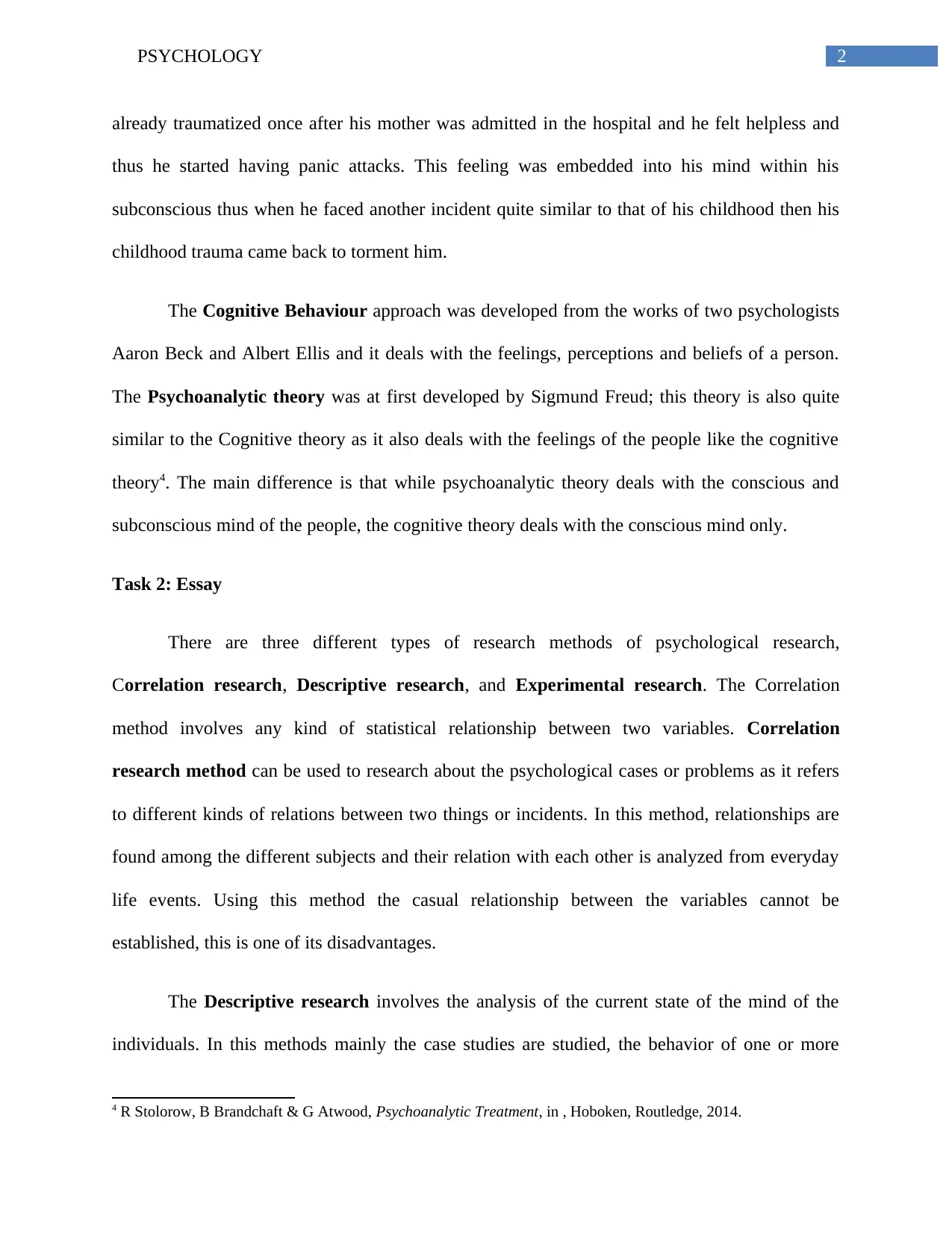
2PSYCHOLOGY
already traumatized once after his mother was admitted in the hospital and he felt helpless and
thus he started having panic attacks. This feeling was embedded into his mind within his
subconscious thus when he faced another incident quite similar to that of his childhood then his
childhood trauma came back to torment him.
The Cognitive Behaviour approach was developed from the works of two psychologists
Aaron Beck and Albert Ellis and it deals with the feelings, perceptions and beliefs of a person.
The Psychoanalytic theory was at first developed by Sigmund Freud; this theory is also quite
similar to the Cognitive theory as it also deals with the feelings of the people like the cognitive
theory4. The main difference is that while psychoanalytic theory deals with the conscious and
subconscious mind of the people, the cognitive theory deals with the conscious mind only.
Task 2: Essay
There are three different types of research methods of psychological research,
Correlation research, Descriptive research, and Experimental research. The Correlation
method involves any kind of statistical relationship between two variables. Correlation
research method can be used to research about the psychological cases or problems as it refers
to different kinds of relations between two things or incidents. In this method, relationships are
found among the different subjects and their relation with each other is analyzed from everyday
life events. Using this method the casual relationship between the variables cannot be
established, this is one of its disadvantages.
The Descriptive research involves the analysis of the current state of the mind of the
individuals. In this methods mainly the case studies are studied, the behavior of one or more
4 R Stolorow, B Brandchaft & G Atwood, Psychoanalytic Treatment, in , Hoboken, Routledge, 2014.
already traumatized once after his mother was admitted in the hospital and he felt helpless and
thus he started having panic attacks. This feeling was embedded into his mind within his
subconscious thus when he faced another incident quite similar to that of his childhood then his
childhood trauma came back to torment him.
The Cognitive Behaviour approach was developed from the works of two psychologists
Aaron Beck and Albert Ellis and it deals with the feelings, perceptions and beliefs of a person.
The Psychoanalytic theory was at first developed by Sigmund Freud; this theory is also quite
similar to the Cognitive theory as it also deals with the feelings of the people like the cognitive
theory4. The main difference is that while psychoanalytic theory deals with the conscious and
subconscious mind of the people, the cognitive theory deals with the conscious mind only.
Task 2: Essay
There are three different types of research methods of psychological research,
Correlation research, Descriptive research, and Experimental research. The Correlation
method involves any kind of statistical relationship between two variables. Correlation
research method can be used to research about the psychological cases or problems as it refers
to different kinds of relations between two things or incidents. In this method, relationships are
found among the different subjects and their relation with each other is analyzed from everyday
life events. Using this method the casual relationship between the variables cannot be
established, this is one of its disadvantages.
The Descriptive research involves the analysis of the current state of the mind of the
individuals. In this methods mainly the case studies are studied, the behavior of one or more
4 R Stolorow, B Brandchaft & G Atwood, Psychoanalytic Treatment, in , Hoboken, Routledge, 2014.
⊘ This is a preview!⊘
Do you want full access?
Subscribe today to unlock all pages.

Trusted by 1+ million students worldwide
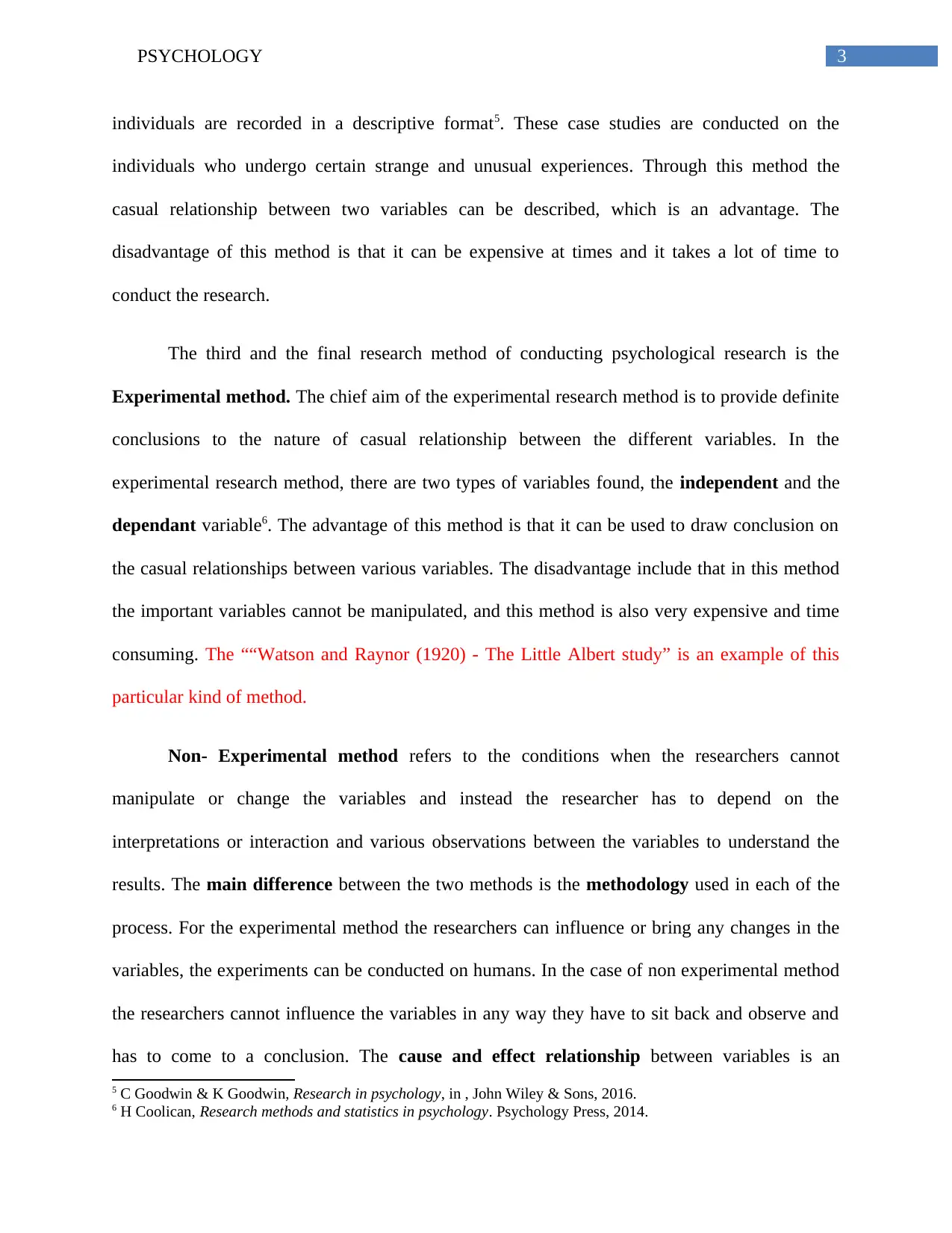
3PSYCHOLOGY
individuals are recorded in a descriptive format5. These case studies are conducted on the
individuals who undergo certain strange and unusual experiences. Through this method the
casual relationship between two variables can be described, which is an advantage. The
disadvantage of this method is that it can be expensive at times and it takes a lot of time to
conduct the research.
The third and the final research method of conducting psychological research is the
Experimental method. The chief aim of the experimental research method is to provide definite
conclusions to the nature of casual relationship between the different variables. In the
experimental research method, there are two types of variables found, the independent and the
dependant variable6. The advantage of this method is that it can be used to draw conclusion on
the casual relationships between various variables. The disadvantage include that in this method
the important variables cannot be manipulated, and this method is also very expensive and time
consuming. The ““Watson and Raynor (1920) - The Little Albert study” is an example of this
particular kind of method.
Non- Experimental method refers to the conditions when the researchers cannot
manipulate or change the variables and instead the researcher has to depend on the
interpretations or interaction and various observations between the variables to understand the
results. The main difference between the two methods is the methodology used in each of the
process. For the experimental method the researchers can influence or bring any changes in the
variables, the experiments can be conducted on humans. In the case of non experimental method
the researchers cannot influence the variables in any way they have to sit back and observe and
has to come to a conclusion. The cause and effect relationship between variables is an
5 C Goodwin & K Goodwin, Research in psychology, in , John Wiley & Sons, 2016.
6 H Coolican, Research methods and statistics in psychology. Psychology Press, 2014.
individuals are recorded in a descriptive format5. These case studies are conducted on the
individuals who undergo certain strange and unusual experiences. Through this method the
casual relationship between two variables can be described, which is an advantage. The
disadvantage of this method is that it can be expensive at times and it takes a lot of time to
conduct the research.
The third and the final research method of conducting psychological research is the
Experimental method. The chief aim of the experimental research method is to provide definite
conclusions to the nature of casual relationship between the different variables. In the
experimental research method, there are two types of variables found, the independent and the
dependant variable6. The advantage of this method is that it can be used to draw conclusion on
the casual relationships between various variables. The disadvantage include that in this method
the important variables cannot be manipulated, and this method is also very expensive and time
consuming. The ““Watson and Raynor (1920) - The Little Albert study” is an example of this
particular kind of method.
Non- Experimental method refers to the conditions when the researchers cannot
manipulate or change the variables and instead the researcher has to depend on the
interpretations or interaction and various observations between the variables to understand the
results. The main difference between the two methods is the methodology used in each of the
process. For the experimental method the researchers can influence or bring any changes in the
variables, the experiments can be conducted on humans. In the case of non experimental method
the researchers cannot influence the variables in any way they have to sit back and observe and
has to come to a conclusion. The cause and effect relationship between variables is an
5 C Goodwin & K Goodwin, Research in psychology, in , John Wiley & Sons, 2016.
6 H Coolican, Research methods and statistics in psychology. Psychology Press, 2014.
Paraphrase This Document
Need a fresh take? Get an instant paraphrase of this document with our AI Paraphraser
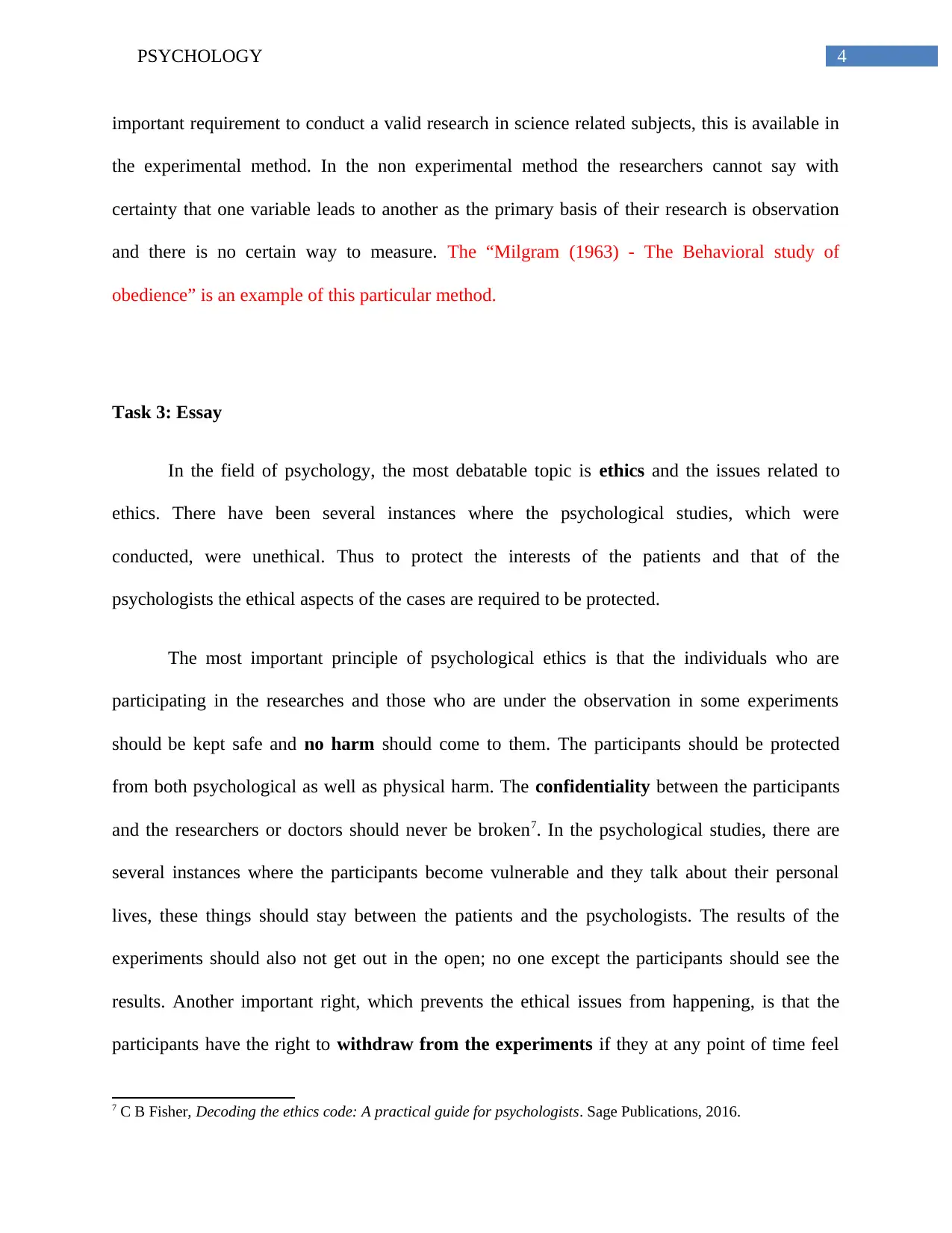
4PSYCHOLOGY
important requirement to conduct a valid research in science related subjects, this is available in
the experimental method. In the non experimental method the researchers cannot say with
certainty that one variable leads to another as the primary basis of their research is observation
and there is no certain way to measure. The “Milgram (1963) - The Behavioral study of
obedience” is an example of this particular method.
Task 3: Essay
In the field of psychology, the most debatable topic is ethics and the issues related to
ethics. There have been several instances where the psychological studies, which were
conducted, were unethical. Thus to protect the interests of the patients and that of the
psychologists the ethical aspects of the cases are required to be protected.
The most important principle of psychological ethics is that the individuals who are
participating in the researches and those who are under the observation in some experiments
should be kept safe and no harm should come to them. The participants should be protected
from both psychological as well as physical harm. The confidentiality between the participants
and the researchers or doctors should never be broken7. In the psychological studies, there are
several instances where the participants become vulnerable and they talk about their personal
lives, these things should stay between the patients and the psychologists. The results of the
experiments should also not get out in the open; no one except the participants should see the
results. Another important right, which prevents the ethical issues from happening, is that the
participants have the right to withdraw from the experiments if they at any point of time feel
7 C B Fisher, Decoding the ethics code: A practical guide for psychologists. Sage Publications, 2016.
important requirement to conduct a valid research in science related subjects, this is available in
the experimental method. In the non experimental method the researchers cannot say with
certainty that one variable leads to another as the primary basis of their research is observation
and there is no certain way to measure. The “Milgram (1963) - The Behavioral study of
obedience” is an example of this particular method.
Task 3: Essay
In the field of psychology, the most debatable topic is ethics and the issues related to
ethics. There have been several instances where the psychological studies, which were
conducted, were unethical. Thus to protect the interests of the patients and that of the
psychologists the ethical aspects of the cases are required to be protected.
The most important principle of psychological ethics is that the individuals who are
participating in the researches and those who are under the observation in some experiments
should be kept safe and no harm should come to them. The participants should be protected
from both psychological as well as physical harm. The confidentiality between the participants
and the researchers or doctors should never be broken7. In the psychological studies, there are
several instances where the participants become vulnerable and they talk about their personal
lives, these things should stay between the patients and the psychologists. The results of the
experiments should also not get out in the open; no one except the participants should see the
results. Another important right, which prevents the ethical issues from happening, is that the
participants have the right to withdraw from the experiments if they at any point of time feel
7 C B Fisher, Decoding the ethics code: A practical guide for psychologists. Sage Publications, 2016.
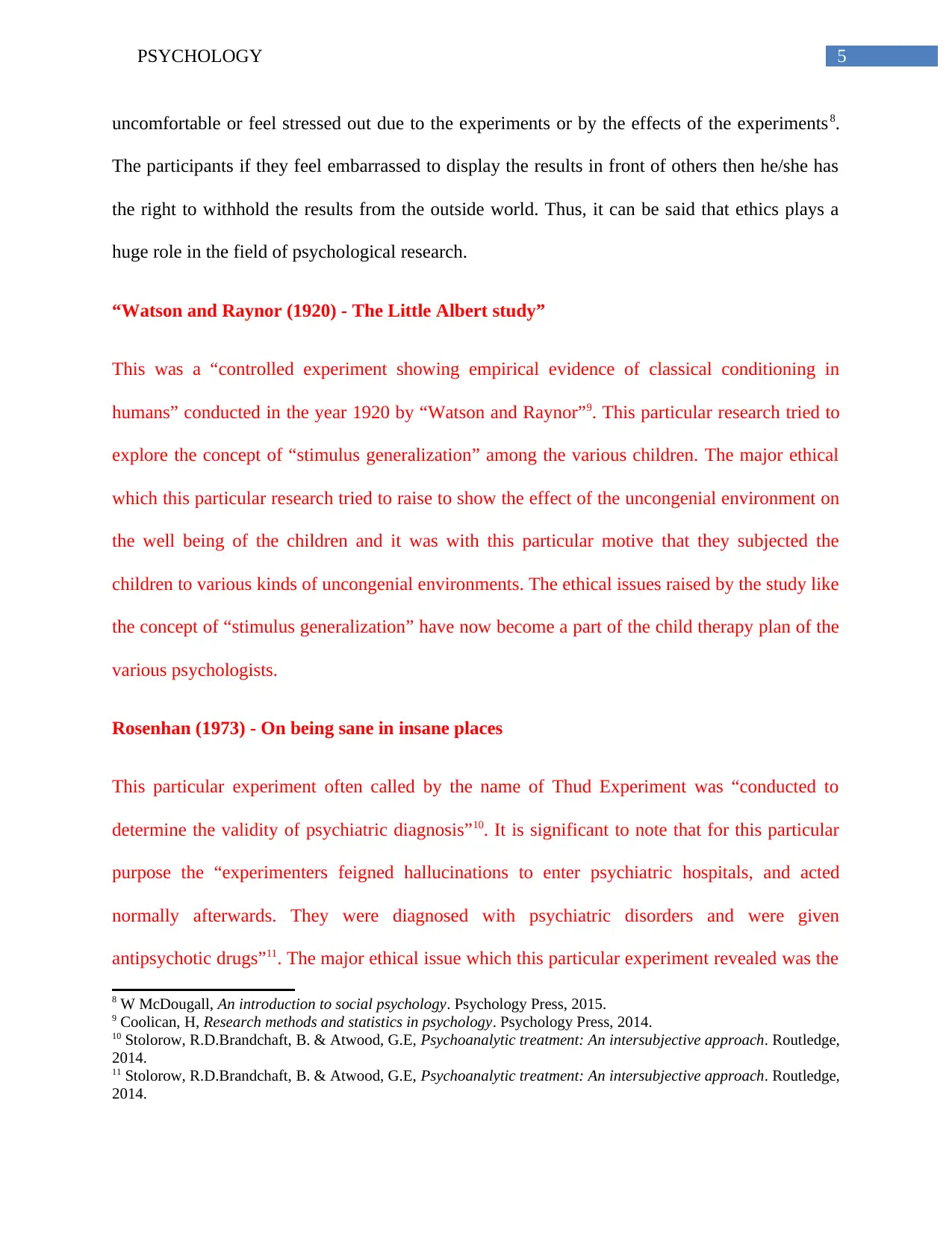
5PSYCHOLOGY
uncomfortable or feel stressed out due to the experiments or by the effects of the experiments8.
The participants if they feel embarrassed to display the results in front of others then he/she has
the right to withhold the results from the outside world. Thus, it can be said that ethics plays a
huge role in the field of psychological research.
“Watson and Raynor (1920) - The Little Albert study”
This was a “controlled experiment showing empirical evidence of classical conditioning in
humans” conducted in the year 1920 by “Watson and Raynor”9. This particular research tried to
explore the concept of “stimulus generalization” among the various children. The major ethical
which this particular research tried to raise to show the effect of the uncongenial environment on
the well being of the children and it was with this particular motive that they subjected the
children to various kinds of uncongenial environments. The ethical issues raised by the study like
the concept of “stimulus generalization” have now become a part of the child therapy plan of the
various psychologists.
Rosenhan (1973) - On being sane in insane places
This particular experiment often called by the name of Thud Experiment was “conducted to
determine the validity of psychiatric diagnosis”10. It is significant to note that for this particular
purpose the “experimenters feigned hallucinations to enter psychiatric hospitals, and acted
normally afterwards. They were diagnosed with psychiatric disorders and were given
antipsychotic drugs”11. The major ethical issue which this particular experiment revealed was the
8 W McDougall, An introduction to social psychology. Psychology Press, 2015.
9 Coolican, H, Research methods and statistics in psychology. Psychology Press, 2014.
10 Stolorow, R.D.Brandchaft, B. & Atwood, G.E, Psychoanalytic treatment: An intersubjective approach. Routledge,
2014.
11 Stolorow, R.D.Brandchaft, B. & Atwood, G.E, Psychoanalytic treatment: An intersubjective approach. Routledge,
2014.
uncomfortable or feel stressed out due to the experiments or by the effects of the experiments8.
The participants if they feel embarrassed to display the results in front of others then he/she has
the right to withhold the results from the outside world. Thus, it can be said that ethics plays a
huge role in the field of psychological research.
“Watson and Raynor (1920) - The Little Albert study”
This was a “controlled experiment showing empirical evidence of classical conditioning in
humans” conducted in the year 1920 by “Watson and Raynor”9. This particular research tried to
explore the concept of “stimulus generalization” among the various children. The major ethical
which this particular research tried to raise to show the effect of the uncongenial environment on
the well being of the children and it was with this particular motive that they subjected the
children to various kinds of uncongenial environments. The ethical issues raised by the study like
the concept of “stimulus generalization” have now become a part of the child therapy plan of the
various psychologists.
Rosenhan (1973) - On being sane in insane places
This particular experiment often called by the name of Thud Experiment was “conducted to
determine the validity of psychiatric diagnosis”10. It is significant to note that for this particular
purpose the “experimenters feigned hallucinations to enter psychiatric hospitals, and acted
normally afterwards. They were diagnosed with psychiatric disorders and were given
antipsychotic drugs”11. The major ethical issue which this particular experiment revealed was the
8 W McDougall, An introduction to social psychology. Psychology Press, 2015.
9 Coolican, H, Research methods and statistics in psychology. Psychology Press, 2014.
10 Stolorow, R.D.Brandchaft, B. & Atwood, G.E, Psychoanalytic treatment: An intersubjective approach. Routledge,
2014.
11 Stolorow, R.D.Brandchaft, B. & Atwood, G.E, Psychoanalytic treatment: An intersubjective approach. Routledge,
2014.
⊘ This is a preview!⊘
Do you want full access?
Subscribe today to unlock all pages.

Trusted by 1+ million students worldwide
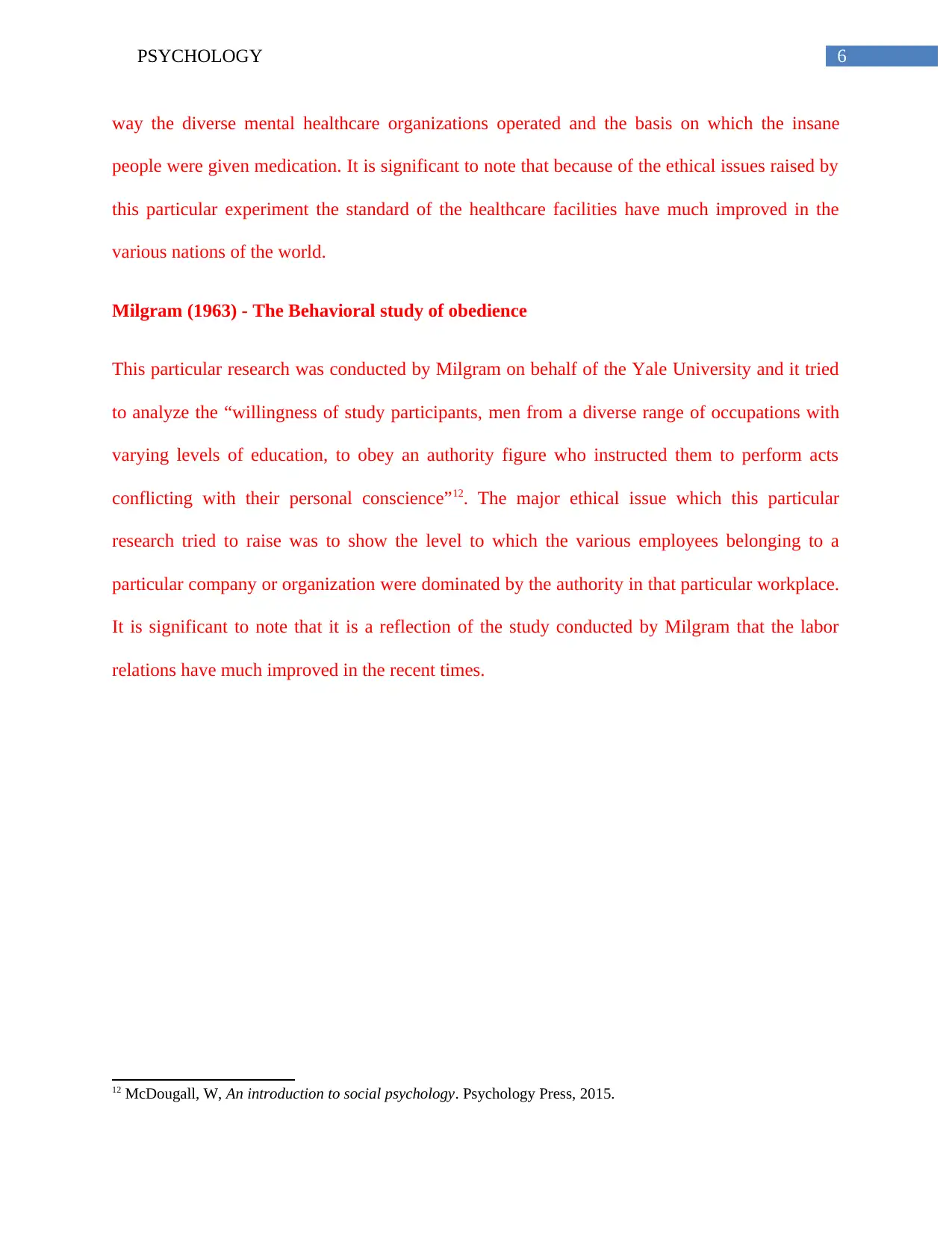
6PSYCHOLOGY
way the diverse mental healthcare organizations operated and the basis on which the insane
people were given medication. It is significant to note that because of the ethical issues raised by
this particular experiment the standard of the healthcare facilities have much improved in the
various nations of the world.
Milgram (1963) - The Behavioral study of obedience
This particular research was conducted by Milgram on behalf of the Yale University and it tried
to analyze the “willingness of study participants, men from a diverse range of occupations with
varying levels of education, to obey an authority figure who instructed them to perform acts
conflicting with their personal conscience”12. The major ethical issue which this particular
research tried to raise was to show the level to which the various employees belonging to a
particular company or organization were dominated by the authority in that particular workplace.
It is significant to note that it is a reflection of the study conducted by Milgram that the labor
relations have much improved in the recent times.
12 McDougall, W, An introduction to social psychology. Psychology Press, 2015.
way the diverse mental healthcare organizations operated and the basis on which the insane
people were given medication. It is significant to note that because of the ethical issues raised by
this particular experiment the standard of the healthcare facilities have much improved in the
various nations of the world.
Milgram (1963) - The Behavioral study of obedience
This particular research was conducted by Milgram on behalf of the Yale University and it tried
to analyze the “willingness of study participants, men from a diverse range of occupations with
varying levels of education, to obey an authority figure who instructed them to perform acts
conflicting with their personal conscience”12. The major ethical issue which this particular
research tried to raise was to show the level to which the various employees belonging to a
particular company or organization were dominated by the authority in that particular workplace.
It is significant to note that it is a reflection of the study conducted by Milgram that the labor
relations have much improved in the recent times.
12 McDougall, W, An introduction to social psychology. Psychology Press, 2015.
Paraphrase This Document
Need a fresh take? Get an instant paraphrase of this document with our AI Paraphraser
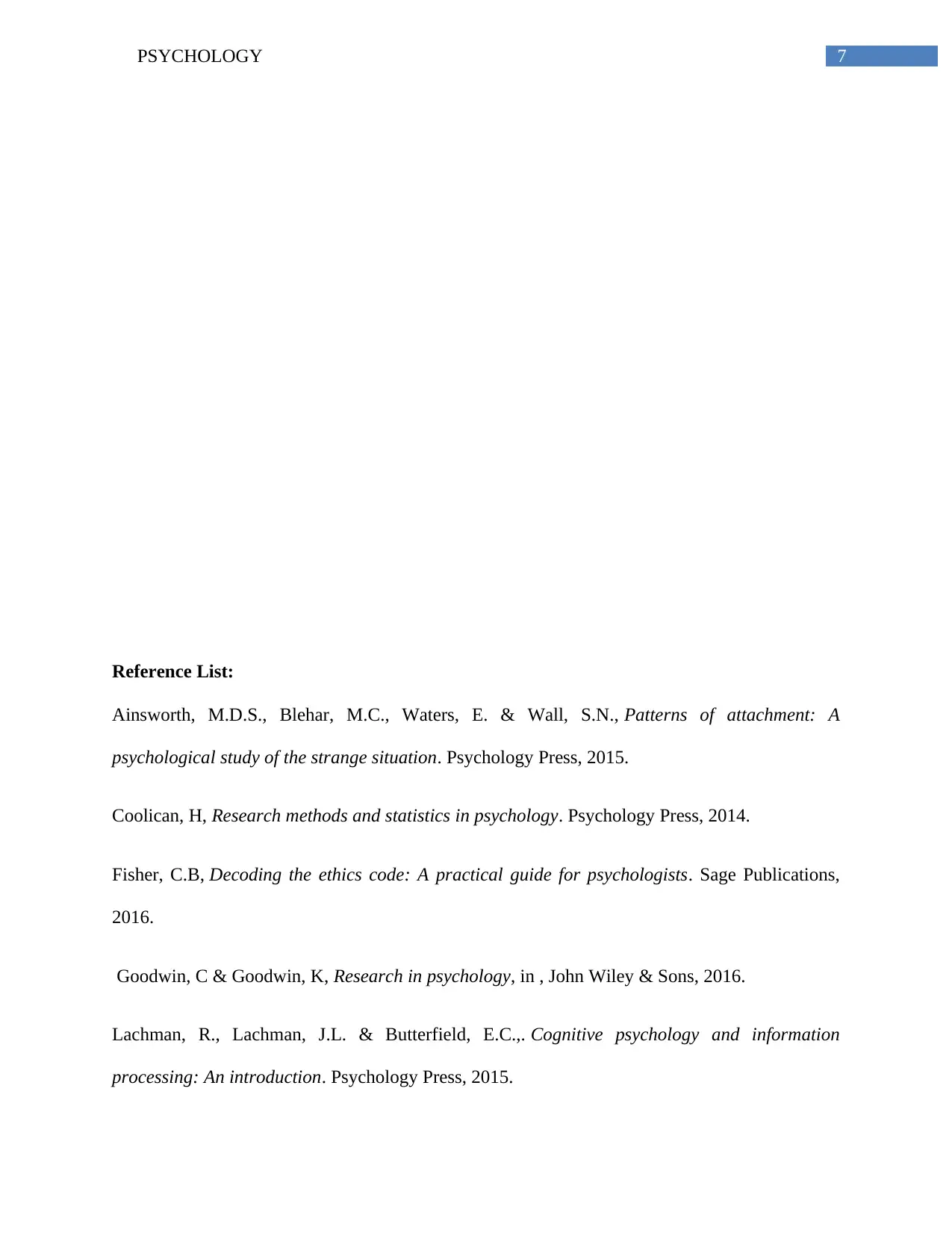
7PSYCHOLOGY
Reference List:
Ainsworth, M.D.S., Blehar, M.C., Waters, E. & Wall, S.N., Patterns of attachment: A
psychological study of the strange situation. Psychology Press, 2015.
Coolican, H, Research methods and statistics in psychology. Psychology Press, 2014.
Fisher, C.B, Decoding the ethics code: A practical guide for psychologists. Sage Publications,
2016.
Goodwin, C & Goodwin, K, Research in psychology, in , John Wiley & Sons, 2016.
Lachman, R., Lachman, J.L. & Butterfield, E.C.,. Cognitive psychology and information
processing: An introduction. Psychology Press, 2015.
Reference List:
Ainsworth, M.D.S., Blehar, M.C., Waters, E. & Wall, S.N., Patterns of attachment: A
psychological study of the strange situation. Psychology Press, 2015.
Coolican, H, Research methods and statistics in psychology. Psychology Press, 2014.
Fisher, C.B, Decoding the ethics code: A practical guide for psychologists. Sage Publications,
2016.
Goodwin, C & Goodwin, K, Research in psychology, in , John Wiley & Sons, 2016.
Lachman, R., Lachman, J.L. & Butterfield, E.C.,. Cognitive psychology and information
processing: An introduction. Psychology Press, 2015.
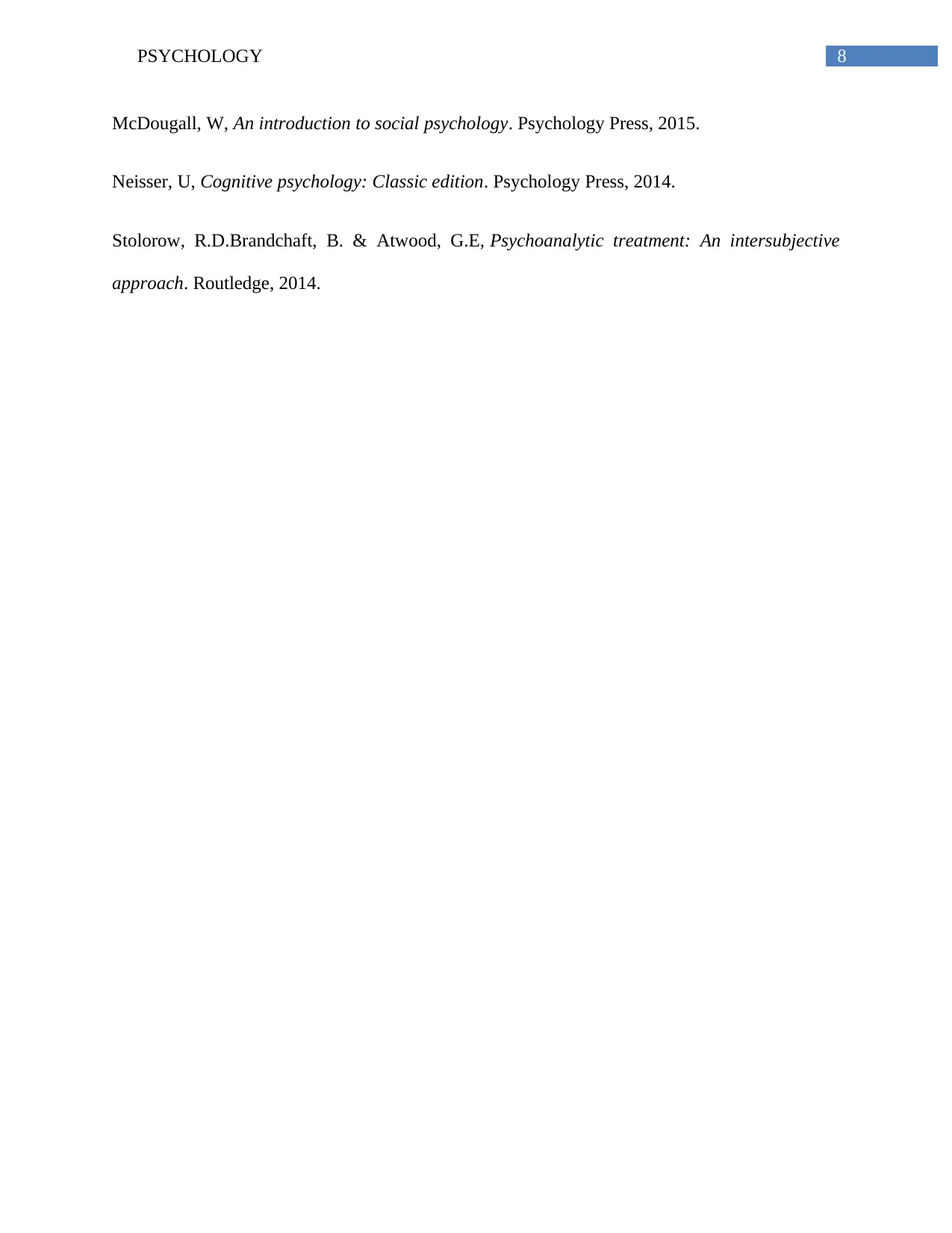
8PSYCHOLOGY
McDougall, W, An introduction to social psychology. Psychology Press, 2015.
Neisser, U, Cognitive psychology: Classic edition. Psychology Press, 2014.
Stolorow, R.D.Brandchaft, B. & Atwood, G.E, Psychoanalytic treatment: An intersubjective
approach. Routledge, 2014.
McDougall, W, An introduction to social psychology. Psychology Press, 2015.
Neisser, U, Cognitive psychology: Classic edition. Psychology Press, 2014.
Stolorow, R.D.Brandchaft, B. & Atwood, G.E, Psychoanalytic treatment: An intersubjective
approach. Routledge, 2014.
⊘ This is a preview!⊘
Do you want full access?
Subscribe today to unlock all pages.

Trusted by 1+ million students worldwide
1 out of 9
Related Documents
Your All-in-One AI-Powered Toolkit for Academic Success.
+13062052269
info@desklib.com
Available 24*7 on WhatsApp / Email
![[object Object]](/_next/static/media/star-bottom.7253800d.svg)
Unlock your academic potential
© 2024 | Zucol Services PVT LTD | All rights reserved.




